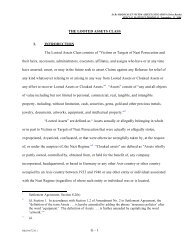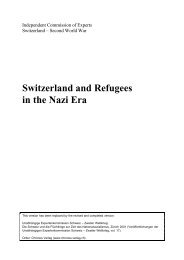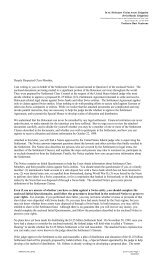Switzerland and Gold Transactions in the Second World War
Switzerland and Gold Transactions in the Second World War
Switzerland and Gold Transactions in the Second World War
Create successful ePaper yourself
Turn your PDF publications into a flip-book with our unique Google optimized e-Paper software.
Interim Report on <strong>Gold</strong><br />
18<br />
Introduction<br />
recently research has generally centered on central banks’ gold policies, <strong>and</strong> <strong>the</strong>re has been<br />
scant research on how gold from ghettos, concentration camps, <strong>and</strong> exterm<strong>in</strong>ation camps was<br />
stolen <strong>and</strong> disposed of.<br />
The issue of how much decision-makers knew of German atrocities dur<strong>in</strong>g <strong>the</strong> war has recently<br />
attracted considerable attention. The argument that decision-makers at <strong>the</strong> SNB simply trusted<br />
<strong>the</strong> Nazis, were unaware of <strong>the</strong> orig<strong>in</strong>s of German gold <strong>and</strong> acted <strong>in</strong> good faith has been<br />
refuted. Never<strong>the</strong>less, <strong>the</strong>re has not yet been a study exam<strong>in</strong><strong>in</strong>g <strong>the</strong> motivations <strong>and</strong> mentality<br />
of top SNB decision-makers. Such a study might expla<strong>in</strong> why <strong>the</strong>se bankers did not have a<br />
clear idea of <strong>the</strong> nature of <strong>the</strong>ir <strong>in</strong>volvement. Did <strong>the</strong>y not want to know? What <strong>in</strong>formation did<br />
<strong>the</strong>y resist know<strong>in</strong>g? S<strong>in</strong>ce <strong>the</strong>y had received conflict<strong>in</strong>g <strong>in</strong>formation, whom did <strong>the</strong>y believe?<br />
Why did <strong>the</strong> SNB Govern<strong>in</strong>g Board have such a close <strong>and</strong> friendly relationship with a dubious<br />
figure like Emil Puhl, Vice-President of <strong>the</strong> Reichsbank? We believe <strong>the</strong>se are central issues,<br />
but can only provide partial answers <strong>in</strong> this <strong>in</strong>terim report.<br />
It is important to remember that gold operations <strong>in</strong> <strong>Switzerl<strong>and</strong></strong> took place <strong>in</strong> a broad<br />
<strong>in</strong>ternational context, <strong>and</strong> <strong>the</strong>re was a complex <strong>in</strong>terplay between long-term developments <strong>and</strong><br />
solitary events. The emergence of <strong>Switzerl<strong>and</strong></strong> as a f<strong>in</strong>ancial center began <strong>in</strong> <strong>the</strong> second half of<br />
<strong>the</strong> 19th century, <strong>and</strong> <strong>the</strong> process of economic evolution cont<strong>in</strong>ues to this day. Nazi loot<strong>in</strong>g<br />
was clearly conf<strong>in</strong>ed to a limited time period. <strong>Gold</strong> played a role <strong>in</strong> both of <strong>the</strong>se very different<br />
developments. As territorial expansion was a key aspect of German policy, gold became an<br />
<strong>in</strong>creas<strong>in</strong>gly important raw material with military applications, as a 1937 German study<br />
<strong>in</strong>dicated. 45<br />
For <strong>Switzerl<strong>and</strong></strong>, gold trad<strong>in</strong>g was not of great economic significance before <strong>World</strong> <strong>War</strong> II.<br />
Never<strong>the</strong>less, <strong>Switzerl<strong>and</strong></strong>’s powerful capital market, driven by <strong>the</strong> Swiss franc, a strong<br />
currency backed by substantial gold cover, was of special importance with<strong>in</strong> Europe <strong>and</strong> gave<br />
Swiss banks a dist<strong>in</strong>ct advantage. With this <strong>in</strong> m<strong>in</strong>d, we need to determ<strong>in</strong>e how <strong>and</strong> to what<br />
extent <strong>Switzerl<strong>and</strong></strong> became a supplier of foreign currency for Germany, a hub for Reichsbank<br />
gold transactions, <strong>and</strong> thus a support for Germany’s war economy after 1941.<br />
To tackle this issue properly, we need to look at <strong>the</strong> provenance <strong>and</strong> uses of gold. In Chapter 1<br />
of this study we set forth <strong>the</strong> results of research <strong>in</strong> tables which <strong>in</strong>dicate gold reserve levels <strong>and</strong><br />
<strong>in</strong>/outflow volumes for Germany <strong>and</strong> <strong>Switzerl<strong>and</strong></strong>. We have also def<strong>in</strong>ed <strong>and</strong> analyzed certa<strong>in</strong><br />
terms relevant to <strong>the</strong> subsequent discussion. We focus on <strong>the</strong> Reichsbank, its role with<strong>in</strong> <strong>the</strong><br />
Nazi system, <strong>and</strong> <strong>the</strong> question of victim gold. We also dist<strong>in</strong>guish between several categories<br />
of gold that Germany placed on <strong>the</strong> <strong>in</strong>ternational market. 46<br />
45<br />
46<br />
Eyssen 1937, p. 1170.<br />
As we said at <strong>the</strong> beg<strong>in</strong>n<strong>in</strong>g, we presented parts of this chapter at <strong>the</strong> London <strong>Gold</strong> Conference held on 2 to 4<br />
December, 1997.







